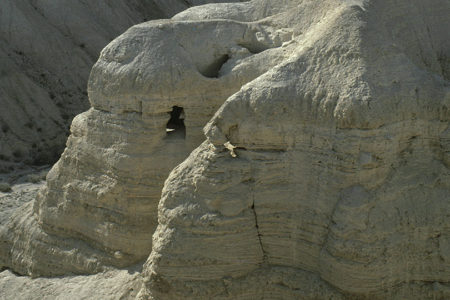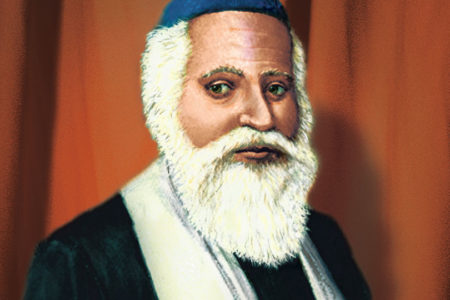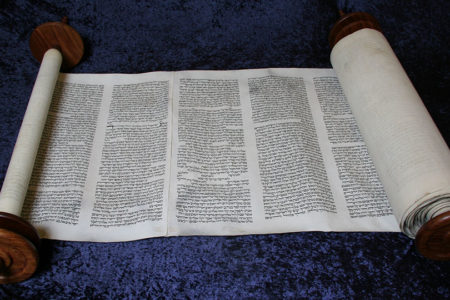Israel’s Messianic Shepherd
Zechariah 10:1–12
In the previous chapter, the Lord is pictured as a shepherd who saves Israel, and Israel becomes “the flock of His people” (9:16). Israel’s redemption will take place when the nation receives the Messiah at His Second Advent.
Chapter 10 continues the theme of Israel’s redemption and restoration. Messiah appears as a compassionate, caring Shepherd who will lead the flock of Israel, vanquish Israel’s enemies, restore and reunite the 12 tribes, and shower the nation with prosperity.
Shepherds of Deception
The temporal blessings promised in Zechariah 9:17 are expounded on in this chapter. These blessings come from God’s hand, not from the idols mentioned in verse 2. Zechariah commanded Israel, “Ask the Lᴏʀᴅ for rain in the time of the latter rain” (v. 1). The “latter rain” comes in late spring (March–April) and is essential for Israel’s crops.
Those asking for rain are assured that the request will be granted: “The Lᴏʀᴅ will make flashing clouds [lightning flashes]; He will give them showers of rain, grass in the field for everyone” (v. 1). Notice, if the men of Israel will only make their requests known to God, He will grant all who ask for rain the amount necessary for a productive harvest.
In the past, the Israelites were led astray by ungodly leaders who failed to direct them to seek God for His help. Instead, their leaders directed them to idols that had no power. Zechariah rightly said that those who divined with idols were full of deception: “For the idols speak delusion; the diviners envision lies, and tell false dreams; they comfort in vain” (v. 2).
These idols (Hebrew, teraphim) were household gods used to “predict” the future. People who practiced such divining were deluded and predicted ungodly lies. They were like fortune-tellers who offered false hope. Their predictions were empty promises, providing no comfort to the expectant Israelite. The Lord had warned Israel not to seek guidance through the abomination of divination (Dt. 18:10–12).
The deception of Israel’s diviners carried consequences. First, the people wandered away from the truth: “Therefore the people wend their way like sheep” (v. 2). Sheep without a shepherd wander and get lost, unable to find their way back to the flock.
Second, Israel was wounded: “They are in trouble because there is no shepherd” (v. 2). The Hebrew word for “trouble” connotes be-ing browbeaten or humbled in the journey through life. The imperfect tense indicates that Israel’s trouble still exists today and will continue until the Messiah removes its sin at His coming.
Third, many of Israel’s shepherds were worthless. The word for “shepherd” refers to Israel’s kings, priests, and prophets—the men who led the nation (v. 2). Under Roman occupation, for example, Israel’s political leaders were corrupt. The nation was described as “sheep having no shepherd” (Mt. 9:36)—a condition that will exist until the Messiah comes to shepherd the nation.
Fourth, the Lord’s wrath will burn against those who abuse the flock of Israel: “My anger is kindled against the shepherds, and I will punish the goatherds” (v. 3). God’s anger burned like a kindling fire against Israel’s apostate leaders. The goatherds are wicked leaders in high places, both Jewish and Gentile, who seek to subjugate and shepherd the flock of Israel for their own profit.
The Shepherd of Perfection
In contrast to Israel’s false shepherds, “the Lᴏʀᴅ of hosts will visit His flock, the house of Judah, and will make them as His royal horse in the battle” (v. 3). In other words, God will take faithful shepherds from His sheepfold in Judah and turn them into His strong army to overthrow the ungodly Gentiles who persecute the Jewish people prior to the Messiah’s return.
Zechariah used four phrases in verse 4, each beginning with the words from him, to describe how Israel’s righteous Messianic Shepherd will help the nation. From him refers to Judah.
- From him comes [is] the cornerstone. Cornerstone is a Messianic title. Throughout Scripture the Messiah is identified as a stone: a stone of stumbling (Isa. 8:14; Rom. 9:32–33), a smitten stone (Ex. 17:6; 1 Cor. 10:4), a smiting stone at His Second Coming (Dan. 2:34–35), and a rejected stone that became the chief cornerstone (Ps. 118:22–23; Mt. 21:42). A cornerstone was the boulder laid at the corner of a building where two walls met. It was the principal stone of a foundation, giving a structure stability and strength. The apostle Paul identified the “chief cornerstone” as Jesus the Messiah (Eph. 2:20). With the Messiah as the cornerstone, Israel’s leaders should not fear her enemies. The complete fulfillment of this prophecy will be at the Messiah’s Second Coming, when He will endow Israel’s leaders with the needed strength and power to conquer their enemies.
- From him [is] the tent peg. A tent peg holds a tent cord taut. In Isaiah 22:15–25, this imagery is used of Eliakim, the son of Hilkiah, who replaced Shebna as administrator of David’s house in Jerusalem. Eliakim was like a tent peg because he brought stability to the house of Judah (vv. 22–23). In Zechariah the term refers to the Messiah, whose leadership, like a deeply driven peg, will bring support, stability, and security to the nation of Judah.
- From him [is] the battle bow. The battle bow symbolizes strength for military conquest. The Messiah is the great Conqueror and Avenger against His and Israel’s enemies (Ps. 45:5; Rev. 19:11–16). When He returns, He will not only give Israel military strength to vanquish its enemies, but He will also give its new leadership the strength and stability to defend the nation under His rule.
- From him [is] every ruler together. The Messiah will empower Judah to drive out every oppressor from Israel. Sensing the Lord’s strength, the people of Judah will be forged into an army of “mighty men,” or strong warriors, who will defeat their enemies and trample them into the “mire of the streets” (v. 5). The cavalry of Gentiles will be overthrown and “put to shame,” or confused and embarrassed by Judah’s victory and subjugation (v. 5). This will take place prior to the establishment of the Millennial Kingdom.
The Lord will have mercy on the entire nation of Israel:
I will strengthen the house of Judah, and I will save the house of Joseph. I will bring them back, because I have mercy on them. They shall be as though I had not cast them aside (v. 6).
Judah represents the southern kingdom, and Joseph represents the 10 tribes of the northern kingdom that separated from Judah after Solomon’s death (931 B.C.). Israel is again forged into one nation due to the Lord’s mercy—His unbroken, unconditional love for the nation. Israel’s worldwide restoration will be comprehensive and complete, as if its division and exile had never taken place. The Lord will forgive and forget Israel’s sin, and the nation will enjoy a new communication with Him. For as God said, “I am the Lᴏʀᴅ their God, and I will hear them” (v. 6); that is, He will listen to their requests and answer quickly.
Ephraim, representing the 10 tribes, will be restored and empowered “like a mighty man” (v. 7). The tribes’ reinstatement and renewal will produce great rejoicing: “And their heart shall rejoice as if with wine. Yes, their children shall see it and be glad” (v. 7). In other words, children will rejoice along with their parents.
The Certainty of Redemption
As a shepherd signals his scattered sheep to come using the shrilling sound of a pipe (Jud. 5:16), so the Lord will whistle His scattered sheep back to their land: “I will whistle for them and gather them, for I will redeem them; and they shall increase as they once increased” (v. 8). His call will be to redeem Jewish people from sin and separate them from the nations into which they were scattered. Since Israel’s exile, its population has remained small (Dt. 28:62). But after its return, the Jewish population will increase greatly, as it did during the captivity in Egypt.
Israel’s dispersion was God’s doing: “I will sow [scatter] them among the peoples, and they shall remember Me in far countries; they shall live, together with their children, and they shall return” (v. 9; cf. Lev. 26:40–42; Dt. 28:63–64; 30:1–3). While living in the Diaspora, Jewish people will “remember” the Lord, that is, turn to Him in repentance (Zech. 13:1). Then God will regather them, along with their children, and “they shall live,” or experience a life of spiritual and physical blessings in Israel. Although Jewish people are experiencing some blessing there today, the fulfillment of this prophecy will come during the Millennium:
I will also bring them back from the land of Egypt, and gather them from Assyria. I will bring them into the land of Gilead and Lebanon, until no more room is found for them (v. 10).
God will bring them back from “Egypt” and “Assyria,” lands that represent the major areas of Israel’s captivities (v. 10). Scripture mentions Assyria in the north and Egypt in the south because they were Israel’s most formidable enemies. These nations represent any world power that would hamper the regathering of the Jewish people to their land. Proud Assyria’s prestige will be broken, and Egypt’s scepter (a symbol of the nation’s governmental authority to obstruct and oppress Israel) will be taken away.
The Jewish people shall take up residence in the land of “Gilead [east of the Jordan River] and Lebanon [northwest of present-day Israel].” This land was promised to Israel in the Abrahamic Covenant.(See Genesis 15:18–21.) So numerous will be the returnees to Israel that “no more room is found for them” (v. 10).
The Lord “shall pass through the sea with affliction [sea of trouble], and strike the waves of the sea: All the depths of the River shall dry up. Then the pride of Assyria shall be brought down, and the scepter of Egypt shall depart” (v. 11). In other words, the Lord will go before the Jewish people to remove every obstacle and barrier that would hamper their worldwide return. Their deliverance will be similar to when the Lord parted the Red Sea to make a way for Israel to escape the Egyptian army (Ex. 14:21–31). Enemies of the Jewish people, like Egypt and Assyria, are used figuratively to show that Israel’s most formidable oppressors will be removed.
God alone supplies the Jewish people with strength to return: “‘So I will strengthen them in the LORD, and they shall walk up and down in His name,’ says the Lᴏʀᴅ” (v. 12). At the Messiah’s Second Coming, the redeemed remnant of Jewish people who return to their land will live in obedience to the Lord. Strong and secure in Him, a redeemed Israel will walk throughout the world as priests and ministers of their God, witnessing to the glory of the Lord with power and great zeal (Isa. 61:6).
What a picture of Israel’s redemption and restoration! Israel’s false shepherds will be replaced by the Messiah of Israel, who is its true Shepherd. He will deliver Israel from all its enemies, visible and invisible, and bring to fruition these words: “I will place salvation in Zion, for Israel My glory” (Isa. 46:13).






